Addl. Solicitor General judges the APIIT Mock Trial competition
View(s):APIIT Law School
The booming voice of the Bailiff was heard loud and clear at the Moot Court of APIIT Law School.
“Please rise. The Access Towers High Court is now in session. The Honourable High Court Judge Sweet is presiding.”
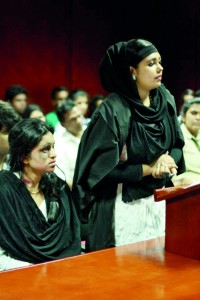
Best actress award was won by law student Shifnaz Mohideen.
The court drama began unfolding itself as the alluring Anoopa, the Mother of two little boys, was put in the dock and was tried, for allegedly killing her husband by setting him alight, when he was asleep.
Two teams of Level two students reading for the Staffordshire University’s Internal LLB (Hons) Degree transformed themselves into witnesses, Legal Counsel, Medical Experts, Jurors and Judges and vociferously and convincingly brought to life the landmark British Trial, R v Ahluwalia (1992), where on appeal the Court accepted that the defendant had been suffering from Battered Woman Syndrome. This was a case where the murder was committed by a woman who was a victim of an abusive and violent marriage. It was shown in this case that the defence of provocation developed from traditional male ideas of reacting instantly to violence with further violence. However, it was illustrated that in domestic violence cases ‘sudden and temporary loss of self control’ test was inappropriate. A woman who had suffered years of violence and abuse finally seizes her opportunity when the husband is asleep or drunk or both and kills him, she may not be reacting to any particular act or incident, but the accumulation of years of abuse, namely cumulative provocation.
The prize for the best actor went to the sedate judge, the Hon Justice Sweet, portrayed by Theekshana Pathirana peering at the jury from between thick locks of powdered hair who said in a
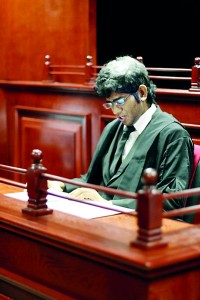
Theekshana Pathirana was adjudged Best Actor.
gruff voice:
“Members of the Jury, you have heard all of the testimony concerning this case. It is up to you to determine the facts. You will then have to apply the facts to the law as I give it to you”
The best actress award was won by law student Shifnaz Mohideen who played the role of the dynamic Defence Counsel who left no stone unturned to show the court the defendant had committed this crime as a last resort. She eloquently described her client in her address to the jury: “A kind-hearted, wife pleading with her husband to return to her and to her children in their family home. We see the writer of the letter as a forgiving woman who was willing to do, all what she could do, to ‘patch up’ a crumbling marriage; even if it meant that she had to forego her basic freedoms and liberties that were vital for a life of dignity.”
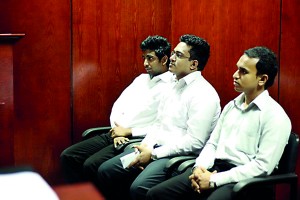
Jurors Sahan Perera, Rukshan Senadheera and Miyuru M Nandajeewa.
Students Kasunjith Satanarachchi convincingly portrayed the part of an exacting, unforgiving, unrelenting and tough prosecutor who persisted convincingly bagged the award for the most outstanding performance.
All thirty students who are in their second year of their LLB programme began their Moot Training with the participation in this vibrant and stimulating mock trial.
The competition was judged and the winners were selected by Senior Additional Solicitor General Mr. Suhada Gamlath, a former Secretary of Justice and counting more than thirty years of experience in prosecuting; well known criminal cases. Mr Suhada Gamlath enlightened the audience on the rudiments of Criminal Procedure of the UK and Sri Lanka and also on the Law of Evidence. He gave invaluable tips on advocacy and court craft.
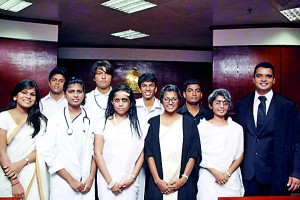 A young Parliamentarian, Hon. Ms Upeksha Swarnamali, who is at present studying law also graced the occasion and gained exposure to the procedural intricacies of a jury trial.
A young Parliamentarian, Hon. Ms Upeksha Swarnamali, who is at present studying law also graced the occasion and gained exposure to the procedural intricacies of a jury trial.
The Senior Lecturer in charge of Mooting Mrs Marini de Livera stated that it is vital that Law Makers familiarise themselves with Constitutional and Legal principles because it is then when armed with this kind of legal background that they can effectively debate and scrutinise the Bills that become law, when making legislation in Parliament.
APIIT has its own state-of-the art Moot Court and as one of the competitors declared: ‘Moot Training is not only for us to collect medals, prizes and trophies but more importantly to bring to the surface hidden talents of future legal and judicial activists who will contribute to build a just and free society .”
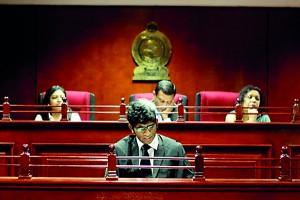 |
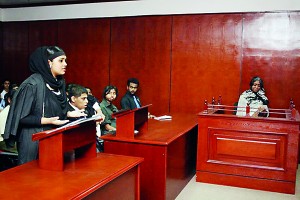 |
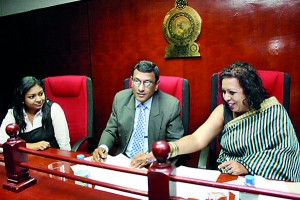 |
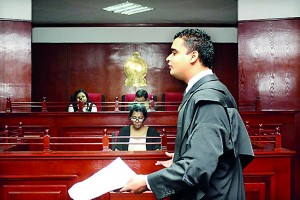 |
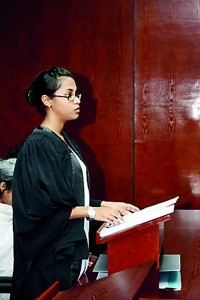 |
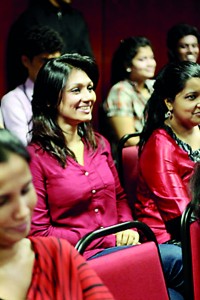 |
Follow @timesonlinelk
comments powered by Disqus





















